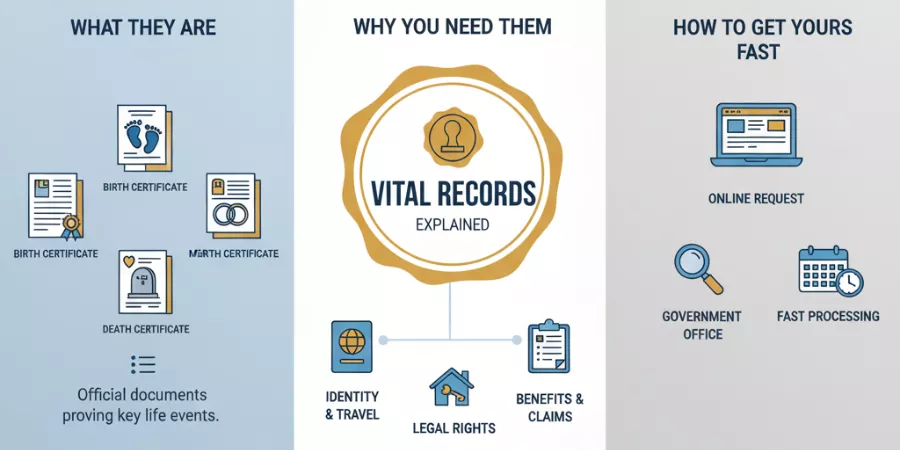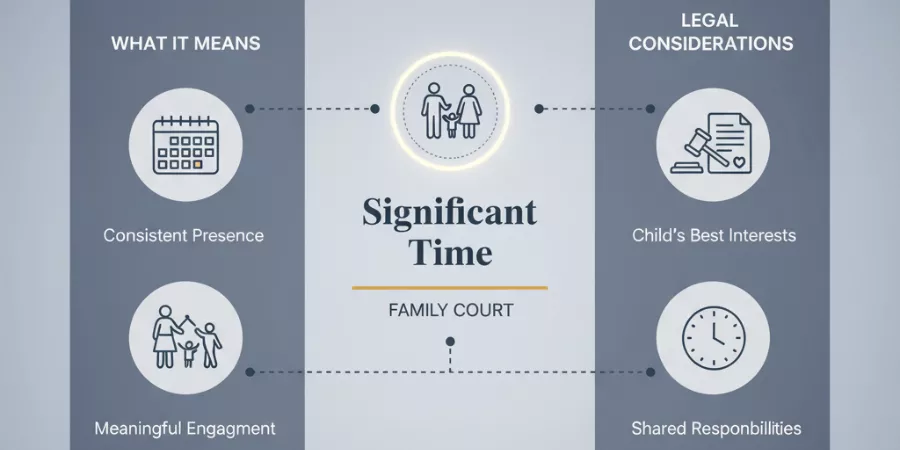We don’t usually give much thought to our birth or marriage certificate — until the day we actually need them.
Maybe you’re applying for your first passport, filing joint taxes, or sorting out family paperwork, and suddenly that one forgotten document becomes the thing standing between you and progress.
That’s the interesting thing about vital records: they’re not just proof of life’s biggest milestones, but also the bureaucratic backbone that makes everything else possible.
In this article, we’ll explore what these vital documents are, why they’re essential, and how to get the necessary documents quickly and without the usual bureaucratic headaches.
What Are Vital Records?
In a nutshell, vital records are government documents that officially record the major events in a person’s life, including births, marriages, and death. They might not seem that significant in your day-to-day routine, but they form the foundation of your legal identity.
When someone is born, a birth certificate is created. When they get married, another record is added. And when one passes away, a death certificate completes the cycle.
These documents are maintained by state authorities and serve as legal proof of who you are, your marital status, and even your existence. Each document in this category plays a special role.
In fact, did you know that over 11 million vital events are reported annually in the United States? This includes some 4.3 million births, 2.4 million deaths, 2.1 million marriages, and 1.1 million divorces — so you can imagine how important these documents are to the systems that run everything from new social security numbers to property transfers.
Why Do You Need Vital Records?
It’s easy to forget about these documents once they’re filed away in a folder or tucked inside a drawer, but the moment you try to apply for a passport without a birth certificate, you realize just how true the word vital really is.
These papers are the building blocks of your legal and financial identity. They confirm who you are, where you were born, and, in many cases, who you’re connected to. Governments, employers, banks, and institutions all depend on them to verify your status, your rights, and even your eligibility for certain services.
- A birth certificate is often the first document you ever receive and the one you’ll need for nearly everything that comes after. It’s required to get a passport, enroll in school, apply for government services, and even open a bank account.
- A marriage certificate, meanwhile, confirms your relationship status and is important for things like joint taxes, applying for spousal visas, or even property ownership.
- Finally, while a death certificate might sound grim, it’s necessary for handling insurance claims, closing accounts, and managing an estate.
Without these records, even basic administrative tasks, from getting health insurance to accessing family benefits, can suddenly become complicated or delayed.
However, that’s not all. Vital records don’t just serve official purposes; they also hold deep personal meaning because they hold the written evidence of your family’s history.
Old birth and marriage certificates can tell stories about where your ancestors lived, who they married, and when they started families of their own. Sometimes, they reveal surprising details like a grandparent’s middle name, a town you never knew your family came from, or even a relative you didn’t realize even existed.
How to Get Vital Records
So, how do you actually get these important documents? In the past, it meant taking time off work, standing in line at a government office, handwriting forms, and then waiting weeks for a response. Thankfully, those days are mostly behind us.
Today, the process is much simpler. Each state keeps its own vital records through its Department or Office of Vital Records. There isn’t a national database, so you’ll need to request the document from the correct state where the event took place.
For example, if you were born in California but now live in New York, your birth certificate still has to come from California’s records office.
The fastest and most convenient way to get your vital records is to order them online through an online service, such as USBirthCertificates. All you have to do is fill out your details and pay the fee.
Once submitted, the application is reviewed and sent directly to the appropriate vital records office for processing. Most people receive their certified copy by mail within a few days or weeks, depending on the state.
If you’re short on time, expedited options are also available. While they may cost a bit more, they can make all the difference when you’re dealing with a new passport application or urgent legal filings.
With modern digital systems, it’s easier than ever to track your order, receive updates by email, and manage everything from home. What used to take hours of waiting and piles of paperwork now takes just a few clicks.












